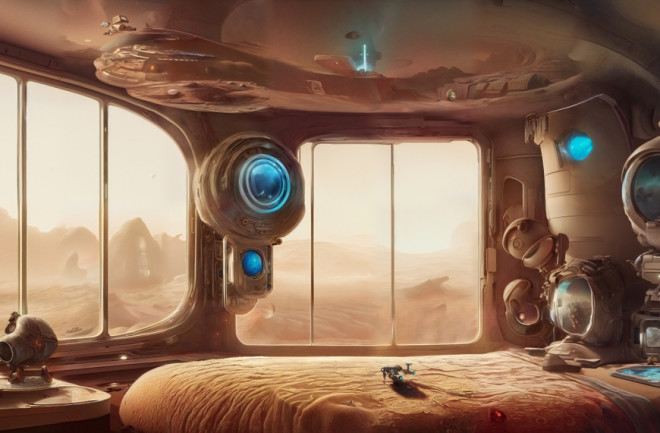By NASA’s current estimates, it would take around seven to eight months to get from Earth to Mars, and that’s on a good day when its orbit comes closest to Earth. And once you get there, it’s not exactly an Eden away from home. Rather, it’s an arid Martian desert with temperatures reaching -81 degrees Fahrenheit regularly.
It’s not habitable without spacesuits and a completely enclosed environment because Mars’ air is about 95 percent carbon dioxide. There’s also no liquid water found on its surface.
But that hasn’t stopped humans from wanting to visit the planet. So what would this outer-planet tourism really entail?
Valentina Sumini, a space architect at MIT Media Lab’s Space Exploration Initiative, says that there are major challenges right now that would largely preclude tourists from visiting Mars, mostly because of the radiation.
According to NASA, “Our planet’s magnetic field and atmosphere protect us from harsh cosmic radiation, but without that, you are more exposed,” which can damage the human body and cause all sorts of degenerative diseases. We’d have to find a fix for this before making the voyage.
What Is Mars Like?
Still, nonetheless, it’s fun to plan. “You’d have to imagine an entirely new type of exploration," says Sumini. In the same way as a trip to Antarctica, a trip to Mars wouldn’t just be about luxury; it would be about having astronauts lead learning experiences around science.
Most of your time as a tourist on Mars would be spent inside, in what Sumini calls “a mix of augmented and virtual reality.” You’d also have to stay in shape and train, working out to fend off the effects of reduced gravity on Mars and microgravity in the voyage getting to the planet.
According to NASA, without gravity, your bones lose minerals, dropping about 1 percent of bone density per month. And you’d have to stay at least two years to get back to Mars’ shortest orbit from Earth.
Read More: The First 'Space Hotel' Plans to Open in 2027
Can Plants Grow on Mars?
It would be difficult to grow plants in Mars’ soil because it’s made of regolith, a reddish space dust that contains poisonous compounds of chlorine in molecules called perchlorates.
Researchers have tried growing plants that mimic conditions on Mars using a soil that’s akin and found in a product called Mars Regolith Simulant. Additionally, you’d have to grow plants that could tolerate shade because, on Mars, you’d get about 60 percent of the light that you would on Earth.
That’s why, says Sumini, food production would revolve around an indoor hydroponic greenhouse. The greenhouse would also serve as a means for tourists to reconnect to the nature they would be missing back home.
“You’d take a stroll in the greenhouse not just for food production but also for relaxation,” says Sumini. The water coming down from the ceiling would not just feed the plants; it would also recreate the feeling of rain in a world where water could only exist indoors.
Read More: How Scientists Create Oxygen for Astronauts on Prolonged Space Missions
Can We Live on Mars?
All of the elements that we take for granted on Earth would not exist on Mars, and therefore, says Sumini, we would have to imagine what it would feel like to be isolated in such an extreme environment. Including finding a way to reconnect with those you’ve left behind on Earth.
Being a tourist on Mars involves finding ways to deal with all of the elements that make it physically inhospitable. But humans are emotional beings, and survival would be about way more than just staying alive. Sumini contends that our most pressing objective might be finding a way to thrive psychologically on the Red Planet.
Read More: Life on Mars May Have Evolved Like a Nice Risotto – Not Too Moist and Not Too Dry

